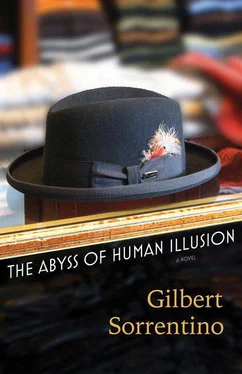But New York was of no help, it didn’t feel at all like home to him, it existed in a kind of aquatic grayness of sleet and dark clouds and sympathetic friends, all of whom performed their parts as carefully as possible, rarely bringing up his wife save once in a while, to call her a bitch, a whore, even, transgressively, a cunt. He stayed with two of these friends, a man and wife, and in the comically sad way in which life crawls and stumbles its way through time, this couple had always been thought of by their passive guest with a kind of jolly but mocking contempt: now he slept on their pull-out Carlyle couch, ate their food, and drank their liquor.
He began to talk to them about his wife, to confide in them, to think of them as the intimate friends that they assuredly were not. In his neurotic and uxorious gloom, he said, in many different ways, the same thing over and over to them: Where is my wife? I want my wife! He would take her back no matter what, ask her nothing, forgive her everything, she could walk on him, kick him, she could spit on him! if only she would come back to him, come back and make him the complete slave and idiot of abasement that he so longed to be. His was a continuing performance that went beyond humiliation, a groveling masochism of which he embarrassingly seemed fully aware. They watched him in silence as he blubbered and wailed; it was horrifying. But not to him.
A week or two into the crazed life that he was sedulously creating for himself, he found out, somehow, that his wife and her kidnapper, her rapist, her Svengali and sinister sexual magician, her depraved wizard, her slavering satyr with his enormous phallus eternally ready for her, only her … he found out that they were living in St. Louis. He had no address for them, and no way of thinking them — of thinking her — into the landscape: what did St. Louis look like? But he unexpectedly got the address from his host, who had a friend in St. Louis, an assistant professor at Washington University. He had no idea how any of this had come about.
He wanted to go to her in strange and alien St. Louis, to plead his case, to beg her, implore her, to dare ask her if she’d had enough abandoned and filthy sex with her seducer; but feared that she certainly would accept his pleadings, his tears, with perverse delight, would abuse him with a word or two of contempt, and send him home alone. He knew this, knew that she was a bitch, a worthless bitch, shallow and corrupt and cruel: oh how he wanted her, she was his bitch! He asked his host then if he would consent to go to St. Louis and, through his friend at the university, meet with his wife, plead for him, set out his case for him, ask her why she’d left, ask her, ask her, ask her, even if he had to do it in front of her smirking lover. He would pay for his trip, his airfare and all expenses, and even include a bonus for his trouble, although he was not so totally unbalanced as to use the word “bonus.” And so the friend left, but was back within three days, for his wife and her amour had apparently left St. Louis, and there was no way of knowing where they had gone. The husband, in his by-now usual imbecilic daze, finally left his friends’ apartment after finding one of his own, a dark and wretched shotgun flat on Fourth Street and Avenue D, a perfect venue to complement his mood of not-quite-suicidal misery. How the streets churned with ignorance and poverty and hatred and violence. Perfect.
The weeks passed and he began, slowly, very slowly, to consider the rash frenzy, really, of his request to his “friend,” the weakness he had revealed to him in his unvarnished pleading that he go as his — what was it? — representative? intermediary? envoy? to his wife. He had exposed himself to this man and his wife, and he was certain that he had given them a social or psychological gift that they would use against him in some way in the future, he didn’t know when, but at some moment in a year or two or more, he’d be confronted with the whining, puerile, blubbering image of his collapse into bathos, he would be presented, as it were, as a milquetoast to whomever would listen. For now it was clear to him that the couple he had thought of with such dismissive contempt for so many years, had thought of him in the same way.
— I —
… Kraft French Dressing, glowing weirdly orange … The label on the bottle describes this dressing as “creamy.” So it was in 1934, so it is now. No one has ever discovered why this dressing, with its odd tang of sugary vinegar, was and is called “French,” nor has anyone suggested a reason for its strange, pumpkin-like color. It is highly popular.
… a bottle of Worcestershire sauce … This sauce was Lea and Perrins, considered by virtually everyone to be the ne plus ultra of Worcestershire sauces. The brand has been made since 1835, and its paper wrapper surely adds to its special cachet. For many years, the label on the bottle noted that it was the recipe of a “nobleman in the county,” or, perhaps, “country,” but that information is no longer provided.
— II—
… the Shadow … The Shadow’s name was Lamont Cranston, and his assistant and (perhaps) fiancée and/or lover was Margo Lane. She was always described as “the lovely Margo Lane.”
… Philco floor-model radio … Philco radios have not been manufactured for many years.
… his black cloak and black slouch hat … While the Shadow wore such raiment in the pulp stories conceived by author Walter B. Gibson, producers of the radio version, which concerns us here, working within the constraints of the medium, imbued the character with a secret power that he had “learned in the Orient,” the power “to cloud men’s minds so that they cannot see him.” Nor, of course, could listeners: it could not have mattered what he wore.
… his unearthly laughter … The Shadow was good, a fighter of crime and oppression, yet the boy is terrified. This might suggest that children know that good may instantly become evil, and vice versa.
— III —
… standing at a dark window … Fictional characters who stand at dark windows are often constrained to look down at streets gleaming with rain. But not here.
— IV —
… his mother sits with a highball … In this instance, Canada Dry ginger ale and Seagram’s 7 blended whisky. The term “highball” is no longer in general use.
… he has been talking, quarreling … The quarrel was about money, specifically, a loan from his father-in-law on which the father would like to delay payment. His wife has taken her father’s side in this argument, not, perhaps, a good sign for the stability of the marriage.
— V —
… a drone of music … It may be inferred that the narrator does not like the music in question. But the conversation? What deductive inference are we to draw from the singular selection, for further commentary, of one type of “drone”?
… The cab was waiting … A checker cab, one of the small, lost pleasures of New York life.
… wearing his wife’s clothes … This is somewhat puzzling. Either the woman was the wife’s size, or the wife’s clothing was of the one-size-fits-all variety.
— VI —
… his wife dead for many years … His wife’s name was Constance (Connie), and his children’s Rose, Maria, Grace, and Alexander (Alex).
— VII —
… Carol and … the girls’ last names, in order, are: Brookner, Kalmas, Margolis, Imperato, Jorgensen, Pincus, Aquino, Griffin, Wasserman, Chaves, Newman, Bello, Scisorek, Vail, and Kirkjian.
… the shade of a birch tree … It may have been a poplar, or whatever you prefer.
Читать дальше












